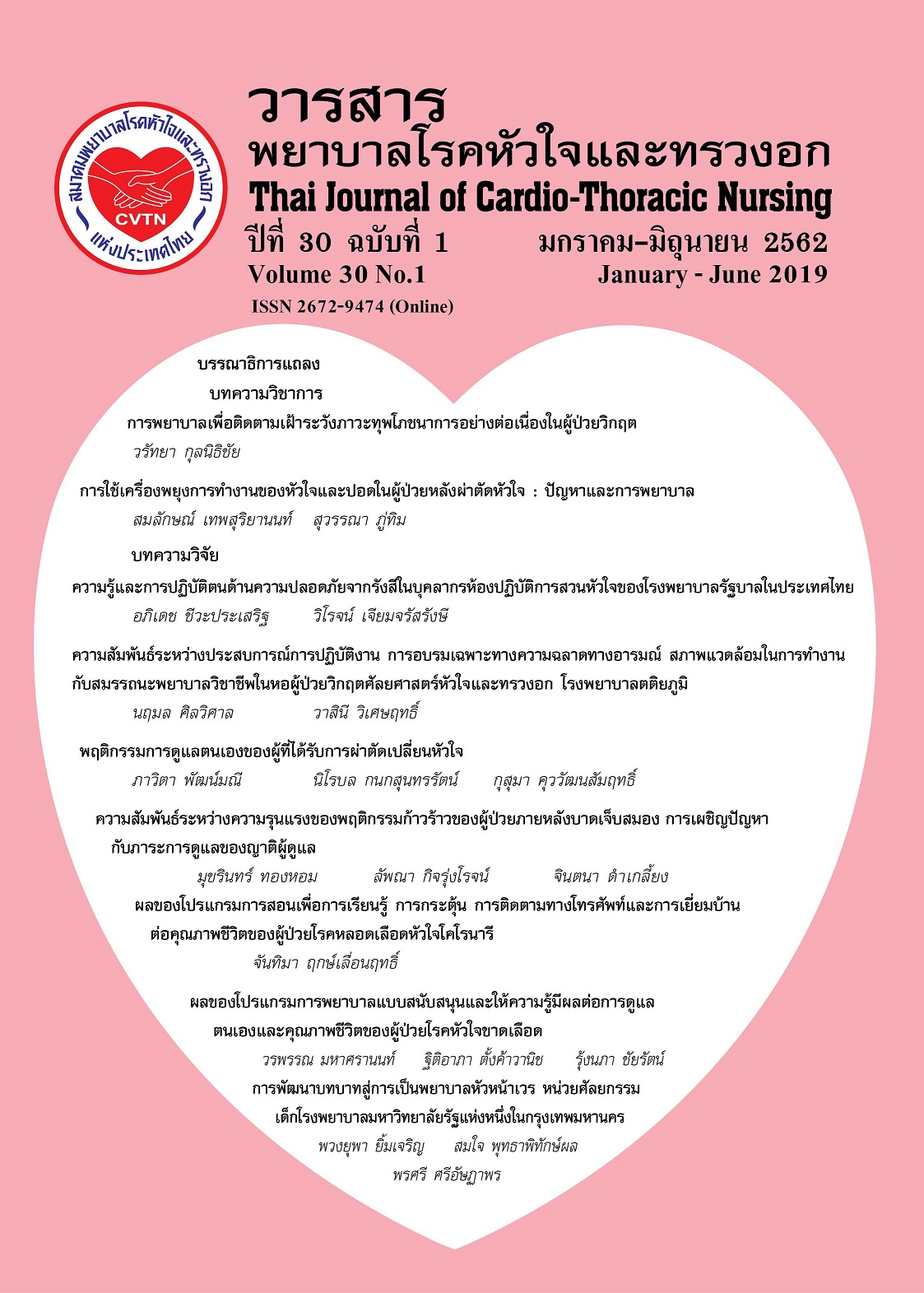Nursing care for continuous monitoring of the malnutrition in critical patients
Keywords:
Nursing care, Malnutrition, Critical patient, Critical care nurse, MonitoringAbstract
Malnutrition is a crucial problem in critical patients. Pathophysiology of critical illness affects abnormal digestion and absorption, including restriction of caring and treatment. Insufficient energy for the body needs lead to clinical negative outcomes such as an increase in longer hospital stays in critical care units, prolonged mechanical ventilation, increased infection rate and mortality rate, including economic and social burden. Critical care nurses play an important role in assessing and monitoring malnutrition continuously. Assessment of signs and symptoms of malnutrition and monitoring the outcome of malnutrition will reduce complications and provide early treatment. This can also improve patient’s recovery resulting in increased better clinical outcomes and reduce consequent of social problems.
The aim of this article is to reveal that critical care nurses should aware and focus on monitoring of patients’ nutritional problems continuously. Critical care nurses should provide care for critical patients to meet the nutritional needs during acute illness. They should also early access malnutrition and monitor nutritional status as well as prevent malnutrition in critical patients. Additionally, critical care nurses should effectively coordinate with multidisciplinary care team to improve quality of care and manage nutrition therapy for critical patients continuously.
References
Ridley E, Gantner D, Pellegrino V. Nutrition therapy in critically ill patients - a review of current evidence for clinician. Clin Nutr. 2015; 34: 565-71.
Ikram S, Hussain E, Zubairl ABS. Nutrition 14 วารสารพยาบาลโรคหัวใจและทรวงอก ปีที่ 30 ฉบับที่ 1 (มกราคม – มิถุนายน) 2562in intensive care in adults review of the literature and development of evidence-based feeding protocols. J Pak Med Assoc. 2016; 66(9): 1154-64.
McClave SA, Taylor BE, Martindale RG, Warren MM, Johnson DR, Braunschweig C, et al. Guidelines for the provision and assessment of nutrition support therapy in the adult critically ill patient: society of critical care medicine (SCCM) and American Society for Parenteral and Enteral Nutrition (A.S.P.E.N.). J Parenter Enteral Nutr. 2016; 40(2): 159-211.
Sheean PM, Peterson SJ, Zhao W, Gurka DP, Braunschweig CA. Intensive medical nutrition therapy: methods to improve nutrition provision in the critical care setting. J Acad Nutr Diet. 2012; 112(7): 1073-9.
Taylor BE, McClave SA, Martindale RG, Warren MM, Johnson DR, Braunschweig C, et al. Guidelines for the provision and assessment of nutrition support therapy in the adult critically ill patient: Society of Critical Care Medicine (SCCM) and American Society for Parenteral and Enteral Nutrition (A.S.P.E.N.). Crit Care Med. 2016; 44(2): 390-438.
Kim H, Stotts NA, Froelicher ES, Engler MM, Porter C, Kwak H. Adequacy of early enteral nutrition in adult patients in the intensive care unit. J Clin Nurs. 2012; 21: 2860-9.
Lumpa S, kaewsaean S. Nutrition status in Critical Ill Patients in Sisaket Hospital. [Internet]. 2015. [cited 2018 Nov 1]. Available from: http://203.157.165.4/ssko_presents/file_presents/1331000033703-13-7639.doc. (In Thai).
Singer P, Blaser AR, Berger MM, Alhazzani W, Calder PC, Casaer M, et al. ESPEN guideline on clinical nutrition in the intensive care unit. Clin Nutr. 2018; 30: 1-32.
Doig GS, Herghes PT,Simpson F,Sweetman EA, Davies AR. Early enteral nutrition, provided within 24 h of injury or intensive care unit admission, significantly reduces mortality in critically ill patients: a meta analysis of randomized controlled trials. Intensive Care Med. 2009; 35(12): 2018-27.
Mulherin DW, Cogle SV. Updates in Nutrition Support for Critically Ill Adult Patients. Hosp Pharm. 2017; 52(1): 17-26.
Society of Parenteral and Enteral Nutrition in Thailand. Recommendations for nutritional care in adult patients admitted to hospital. Bangkok: Society of Parenteral and Enteral Nutrition in Thailand; 2017. (In Thai).
Weimann A, Braga M, Carli F, Higashiguchi T, Hubner M, Klek S, et al. ESPEN guideline: clinical nutrition in surgery. Clin Nutr. 2017;36: 623-50.
Cherry-Bukowiec JR. Optimizing nutrition therapy to enhance mobility in critically ill patients. Crit Care Nurs Q. 2013; 36(1):28-36.
Ndahimana D, Kim EK. Measurement methods for physical activity and energy expenditure: a review. Clin Nutr Res. 2017;6(2): 68-80.
Berger MM, Blaser AR, Calder PC, Casaer M, Hiesmayr Mj, Mayer K, et al. Monitoring nutrition in ICU. Clin Nutr. 2018; 30: 1-10.
Plank LD, Mulherin DW, Cogle SV. Protein Thai Journal of Cardio-Thoracic Nursing Vol. 30 No.1 (January - June) 2019 15for the critically ill patients-what and when?. Eur J Clin. 2013; 67(5).565-8.
Heimburger DC. Malnutrition and nutritional assessment. In: Kasper DL, Fauci AS, Hauser SL, Longo DL, Jameson JL, Loscalzo J, editors. Harrison's principles of internal medicine. 19thed. New York: McGraw Hill Education; 2015. p. 459-64.
Lee H, Kim S, Lim Y, Gwon H, Kim Y, Ahn JJ, et al. Nutrition status and disease severity in patients with chronic obstructive pulmonary disease (COPD). Arch Gerontol Geriat. 2013; 56: 518-23.
Kulnitichai W. Nutrition assessment and parenteral nutrition: Nursing care using nursing process approach. Chiangrai Medical Journal. 2015. 7(2). 135-45. (In Thai).
Summasut R. Principles of nutrition therapy practice.Bankok: Supatra printing; 2009. (In Thai).
Berger MM, Reintam-Blaser A, Calder PC, Casaer M, Hiesmayr MJ, Mayer K, et al. Monitoring nutrition in the icu. Clin Nutr. 2018; pii: s0261-5614: 18(3): 1211-1.
Freidli N, Stanga Z, Culkin A, Crook M, Laviano A, Sobotka L, et al. Management and prevention of refeeding syndrome in medical inpatients: an evidence-based and consensus-supported algorithm. Nutrition. 2017; 47: 13-20.
Rousseau AF, Losser MR, Ichai C, Begger MM. ESPEN endorsed recommendation: nutrition therapy in major burns. Clin Nutr. 2013; 32: 497-502
Downloads
Published
How to Cite
Issue
Section
License
บทความนี้ยังไม่เคยตีพิมพ์หรืออยู่ในระหว่างส่งไปตีพิมพ์ในวารสารอื่น ๆ มาก่อน และกองบรรณาธิการขอสงวนสิทธิ์ในการตรวจทาน และแก้ไขต้นฉบับตามเกณฑ์ของวารสาร ในกรณีที่เรื่องของท่านได้ได้รับการตีพิมพ์ในวารสารฉบับนี้ถือว่าเป็น ลิขสิทธิ์ของวารสารพยาบาลโรคหัวใจและทรวงอก






